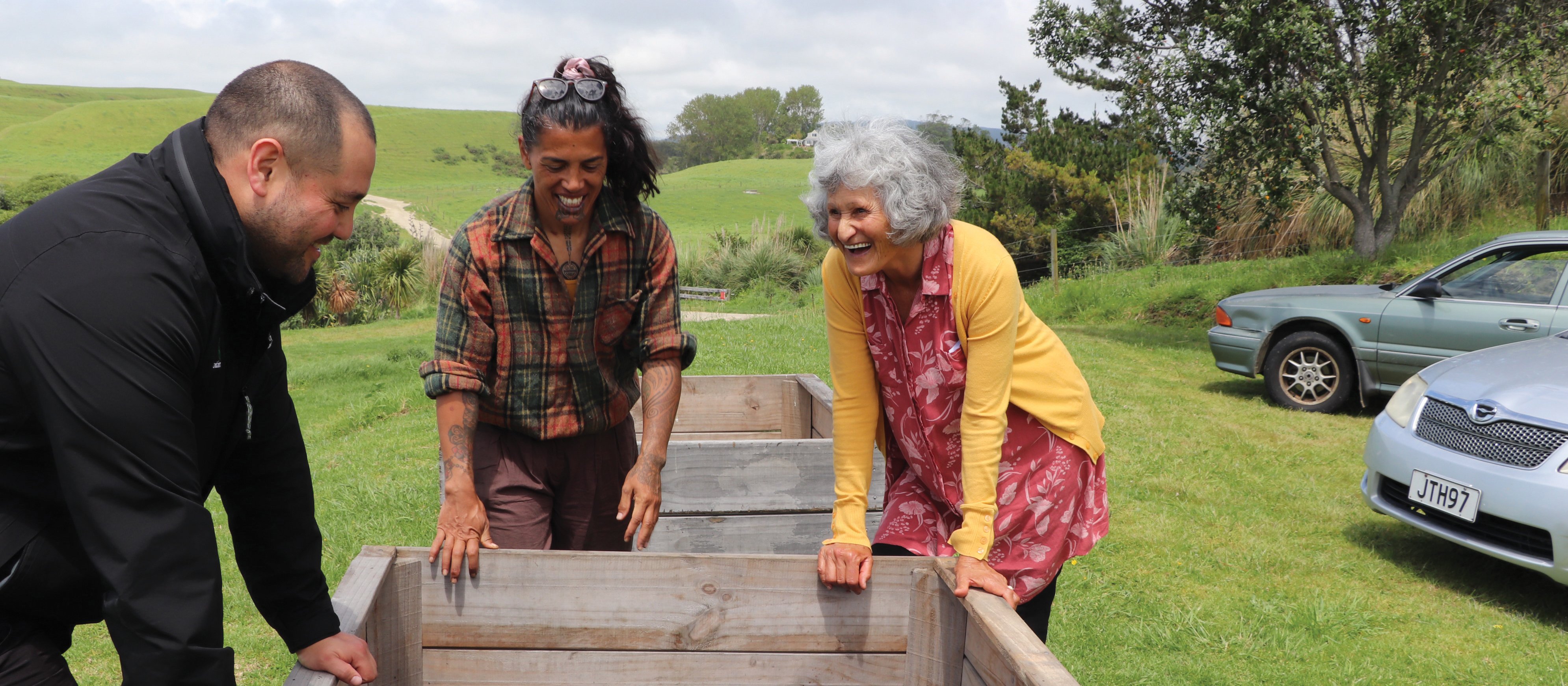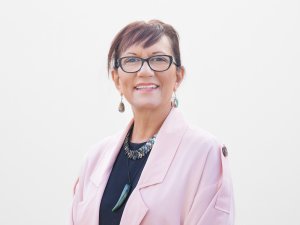Respiratory physician Lutz Beckert considers chronic obstructive pulmonary disease management, including the prevention of COPD, the importance of smoking cessation and pulmonary rehabilitation, and the lifesaving potential of addressing treatable traits. He also discusses the logic of inhaler therapy, moving from single therapy to dual and triple therapy when indicated, as well as other aspects of management
From little things big things grow
From little things big things grow

Here at New Zealand Doctor Rata Aotearoa we are on our summer break! While we're gone, check out Summer Hiatus: Stories we think deserve to be read again! This article was first published on 27 May 2022.
Chosen by Alan Perrott: Simple ideas often have far-reaching impacts. This start starts with some unwanted boxes and a few seeds, and becomes a community builder, cultural awakening and mental health programme all in one
I’m enjoying it. Being able to help in a holistic sense really feels like we are giving back
A Te Puke-based DIY food security programme is delivering an unexpected harvest and it’s all down to some dodgy knees, says Poutiri Wellness Centre chief executive Kirsty Maxwell-Crawford.
At a hauora day at the coastal Ōtamarākau Marae in eastern Bay of Plenty two years ago, Ms Maxwell-Crawford says, her team was watching gardeners at work.
“[They were] planting in a kiwifruit bin and one of the kuia came over and said, ‘I would love one of those for my garden. I can’t garden any more, I can’t get down that low.’
“It was just a thought she was saying aloud, but we had been looking for something we could do to pay [the marae] back for our invitation, so we started to think ‘how do we make this happen?’”
A few phone calls later and the practice had secured an ongoing supply of used bins from kiwifruit growers Trevelyan, Seeka and Apata; then their local Mitre 10 store offered to provide free topsoil.
What had been a throw-away comment quickly became a project for its time as COVID-19 lockdowns increasingly affected local whānau.
Poutiri Wellness Centre already played a large role in the region’s COVID response, and eventually this stretched to running vaccination centres, a mobile nursing service, and Whānau Ora social services.
Practice staff began hearing from whānau struggling to afford healthy food. When combined with wider income-related stress, such as being unable to pay rent, the struggles soon escalated into mental health problems.
The practice was running the regional Mana Kai Mana Ora food sovereignty programme with entities such as Tauranga City Council. So they were already providing converted planting boxes and seeds for staples such as lettuce, carrots, pumpkin and kamokamo under the name Mahi Maara Kai.
While immediately popular, use of the boxes has to be ongoing, says Ms Maxwell-Crawford: “We didn’t want this to be a one-off, where someone might grow things a couple of times then you’d go back a year later and the bin is empty.”
So, practice staff stayed in touch with different whānau, offering help and putting growers in touch with other whānau. Unexpected things began to happen.
Growers began offering surplus produce to neighbours they otherwise had little to do with, and posting videos and photos online to show off their harvest. As gardening became competitive, growers were also taught how to create their own seed banks to become self-sustaining.
Next, they will be taught about preserving surplus food.
It’s about restoring lost knowledge and a connection to culture, says Ms Maxwell-Crawford.
In April, Poutiri Wellness Centre created a closed Mahi Maara Kai Facebook group, where whānau can share stories and motivate one another.
Ms Maxwell-Crawford says once the group reaches 100 members – it’s now at 88 – the practice will step back, leaving one particularly green-fingered staff member to liaise with the group.
Poutiri Wellness Centre GP Tim Chiara says the programme is certainly delivering clear health outcomes.
Dr Chiara highlights one of his patients who had been struggling to reintegrate since being released from prison three years ago.
Not only is this patient growing food for his whānau, his mental health has improved and he is now looking for employment.
“But we are also so aware that there are so many people now, scary high numbers, struggling to find work, struggling to feed their families, and struggling with poor housing which all feeds into their health,” says Dr Chiara.
“Anything we can do to help empower people will have a positive outcome, and we can see people not only growing food, they are coming together as whānau and a community
“I’m enjoying it. Being able to help in a holistic sense really feels like we are giving back.”
The wellness centre is run by Poutiri Charitable Trust, which supports a network of 12 hauora providers throughout Bay of Plenty.






![Barbara Fountain, editor of New Zealand Doctor Rata Aotearoa, and Paul Hutchison, GP and senior medical clinician at Tāmaki Health [Image: Simon Maude]](/sites/default/files/styles/thumbnail_cropped_100/public/2025-03/Barbara%20Fountain%2C%20editor%20of%20New%20Zealand%20Doctor%20Rata%20Aotearoa%2C%20and%20Paul%20Hutchison%2C%20GP%20and%20senior%20medical%20clinician%20at%20T%C4%81maki%20Health%20CR%20Simon%20Maude.jpg?itok=-HbQ1EYA)
![Lori Peters, NP and advanced health improvement practitioner at Mahitahi Hauora, and Jasper Nacilla, NP at The Terrace Medical Centre in Wellington [Image: Simon Maude]](/sites/default/files/styles/thumbnail_cropped_100/public/2025-03/2.%20Lori%20Peters%2C%20NP%20and%20advanced%20HIP%20at%20Mahitahi%20Hauora%2C%20and%20Jasper%20Nacilla%2C%20NP%20at%20The%20Terrace%20Medical%20Centre%20in%20Wellington%20CR%20Simon%20Maude.jpg?itok=sUfbsSF1)
![Ministry of Social Development health and disability coordinator Liz Williams, regional health advisors Mary Mojel and Larah Takarangi, and health and disability coordinators Rebecca Staunton and Myint Than Htut [Image: Simon Maude]](/sites/default/files/styles/thumbnail_cropped_100/public/2025-03/3.%20Ministry%20of%20Social%20Development%27s%20Liz%20Williams%2C%20Mary%20Mojel%2C%20Larah%20Takarangi%2C%20Rebecca%20Staunton%20and%20Myint%20Than%20Htut%20CR%20Simon%20Maude.jpg?itok=9ceOujzC)
![Locum GP Helen Fisher, with Te Kuiti Medical Centre NP Bridget Woodney [Image: Simon Maude]](/sites/default/files/styles/thumbnail_cropped_100/public/2025-03/4.%20Locum%20GP%20Helen%20Fisher%2C%20with%20Te%20Kuiti%20Medical%20Centre%20NP%20Bridget%20Woodney%20CR%20Simon%20Maude.jpg?itok=TJeODetm)
![Ruby Faulkner, GPEP2, with David Small, GPEP3 from The Doctors Greenmeadows in Napier [Image: Simon Maude]](/sites/default/files/styles/thumbnail_cropped_100/public/2025-03/5.%20Ruby%20Faulkner%2C%20GPEP2%2C%20with%20David%20Small%2C%20GPEP3%20from%20The%20Doctors%20Greenmeadows%20in%20Napier%20CR%20Simon%20Maude.jpg?itok=B0u4wsIs)
![Rochelle Langton and Libby Thomas, marketing advisors at the Medical Protection Society [Image: Simon Maude]](/sites/default/files/styles/thumbnail_cropped_100/public/2025-03/6.%20Rochelle%20Langton%20and%20Libby%20Thomas%2C%20marketing%20advisors%20at%20the%20Medical%20Protection%20Society%20CR%20Simon%20Maude.jpg?itok=r52_Cf74)
![Specialist GP Lucy Gibberd, medical advisor at MPS, and Zara Bolam, urgent-care specialist at The Nest Health Centre in Inglewood [Image: Simon Maude]](/sites/default/files/styles/thumbnail_cropped_100/public/2025-03/7.%20Specialist%20GP%20Lucy%20Gibberd%2C%20medical%20advisor%20at%20MPS%2C%20and%20Zara%20Bolam%2C%20urgent-care%20specialist%20at%20The%20Nest%20Health%20Centre%20in%20Inglewood%20CR%20Simon%20Maude.jpg?itok=z8eVoBU3)
![Olivia Blackmore and Trudee Sharp, NPs at Gore Health Centre, and Gaylene Hastie, NP at Queenstown Medical Centre [Image: Simon Maude]](/sites/default/files/styles/thumbnail_cropped_100/public/2025-03/8.%20Olivia%20Blackmore%20and%20Trudee%20Sharp%2C%20NPs%20at%20Gore%20Health%20Centre%2C%20and%20Gaylene%20Hastie%2C%20NP%20at%20Queenstown%20Medical%20Centre%20CR%20Simon%20Maude.jpg?itok=Z6u9d0XH)
![Mary Toloa, specialist GP at Porirua and Union Community Health Service in Wellington, Mara Coler, clinical pharmacist at Tū Ora Compass Health, and Bhavna Mistry, specialist GP at Porirua and Union Community Health Service [Image: Simon Maude]](/sites/default/files/styles/thumbnail_cropped_100/public/2025-03/9.%20Mary%20Toloa%2C%20Porirua%20and%20Union%20Community%20Health%20Service%20in%20Wellington%2C%20Mara%20Coler%2C%20T%C5%AB%20Ora%20Compass%20Health%2C%20and%20Bhavna%20Mistry%2C%20PUCHS%20CR%20Simon%20Maude.jpg?itok=kpChr0cc)